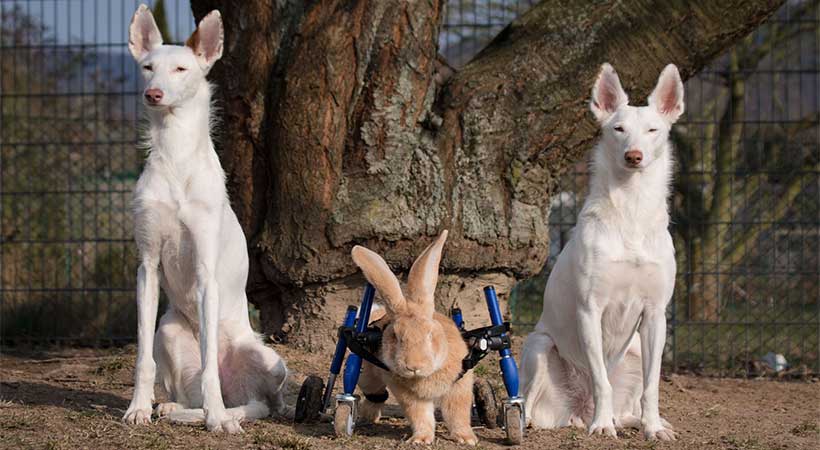How to Help a Dog With Arthritis at Home (10 Changes to Reduce Pain)

Bunny Wheels for Disabled Pet Rabbits
Dog wheelchairs are becoming increasingly popular as mobility aids as people become more familiar with what is readily available to help a mobility challenged pet. Rabbits who have trouble hopping around are now also able to get the help they need with a set of wheels!
Common Causes of Rabbit Mobility Loss

Rabbit mobility loss is often a result of a traumatic spinal injury, but there are many reasons why a rabbit may suddenly lose the use of their back legs.
- Spondylosis of the Lumbar Spine
- IVDD
- Trauma
- Consuming Toxic Substances
- CVA or Stroke
- Neurological conditions
- Cancer
- Heart disease
- Arthritis
Due to the nature of a rabbit's strong rear legs, sometimes injuries involving the spine can occur when a rabbit is being held and panics, or when they jump off of something too high. Injuries like this can lead to hind limb paralysis. A panicked rabbit will kick and squirm to get away which can injure their back.
A paralyzed rabbit will be unable to move their hind legs and may drag their legs behind them when they move around. A bunny in the earlier stages of mobility loss may experience some hind leg weakness, take wobbly steps, or struggle to stand unsupported.
Bunny Wheels an Option to Euthanasia

Owners of disabled rabbits have an option to euthanasia, just like dog owners: pet wheelchairs. Just like with dogs, cats, goats, and other species of animals who use wheelchairs, there are adjustable wheelchairs that fit bunnies as well. Many rabbits are kept indoors as household pets. Therefore, a pet wheelchair could easily make a dramatic change in the bunny's quality of life.
Paralyzed rabbits are at risk for many different conditions including incontinence and pressure sores. It's important that paralyzed bunnies stay upright and mobile for many reasons. Pressure sores form when a rabbit is unable to move, these sores can easily become infected and make a rabbit very sick.
Aslan, the bunny in these photos, uses a full support/4-wheel wheelchair. Whether a full support or rear wheelchair (2-wheel) is recommended depends on the rabbit's medical condition.
Aslan lives in Germany with his majestic canine companions. They seem to get along quite well! Aslan uses his wheels both indoors and out, just like other animals do who use wheels. You can see more photos and videos of Aslan at the Hunderolli (Rollindogs).
When is the right time for a rabbit wheelchair?
Every case is different, rabbits that are injured due to trauma will need time to heal before they can benefit from using a wheelchair. However, a paralyzed rabbit who has healed will typically benefit from a rabbit wheelchair with 4-6 weeks of their initial injury.
The benefits of a bunny wheelchair include:

- Provide the paralyzed bunny with the support needed to stand and maintain balance
- Support the rabbit to promote mobility and make it easier for the to walk on their own
- Reduce the weight placed on arthritic or painful joints
- Improve a rabbit's quality of life
- Provide rehabilitative support as a rabbit regains leg strength

The Popular Bunny Rabbit

Because pet rabbits tend to stay close to home, their popularity is not immediately apparent. The House Rabbit Society (a nonprofit rabbit rescue and education organization), estimates "between 3-7 million" pet rabbits in the United States in 2014." They state that the rabbit is the third most popular companion mammal in the United States, just after the dog and cat.
Rabbits can have medical issues that cause paralysis and injuries that create mobility challenges, just like any other animal. But with a little help of wheels, bunnies can be on the roll and enjoying life again!
Watch this video to see Aslan take his first steps on wheels, as well as other bunnies getting around with wheels. (Aslan is using a size Small Walkin' Wheels; the other rabbits are using a size Mini Walkin' Wheels.)
Is there a bunny in your life who could use a leg up? Consider a rabbit wheelchair!









